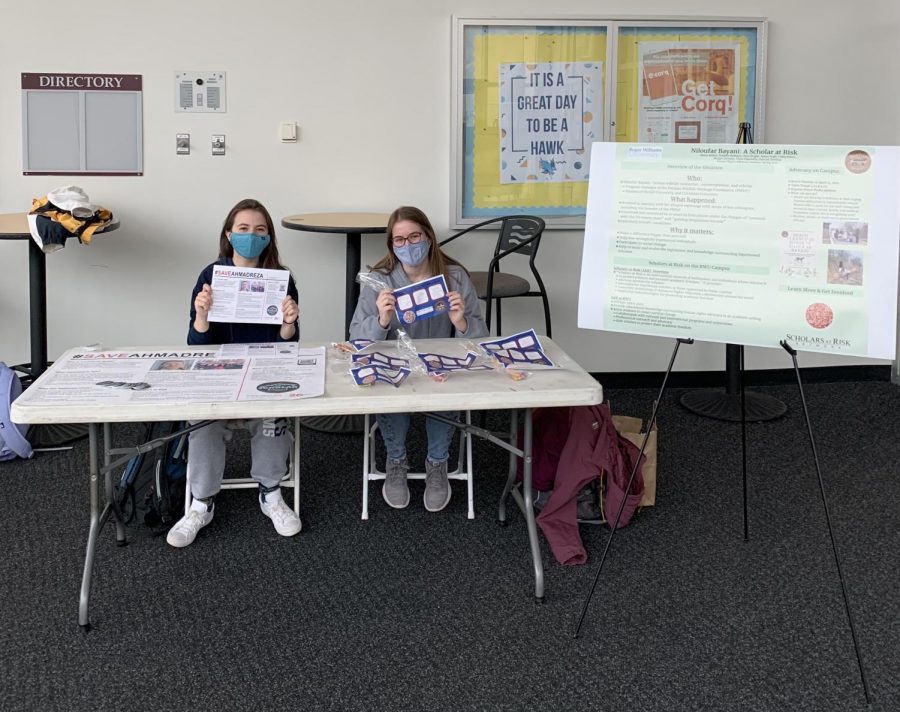Human Rights Seminar advocates for three scholars this semester
Shannon DeFranza (left) and Hannah Sterling (right) participate in Table Times in the Rec Center on April 15 to spread awareness about imprisoned scholars.
The pandemic does not stop human rights work on the RWU campus. Advocacy Seminars, taught this semester by Dr. Robert Cole, allow students to participate in hands-on activities and student-led advocacy in collaboration with Scholars at Risk, a non-profit that works to protect academic freedom and assists more than 300 threatened scholars each year. The advocacy efforts seek to rebut attacks on academic freedom and unfair treatment of individual scholars around the world.
This semester, there are two advocacy seminar groups that run on Tuesdays and Thursdays. In the Thursday class, students are working on behalf of two scholars. One group of students is advocating for the release of Dr. Ahmadreza Djalali. Dr. Djalali is a Swedish-Iranian scholar of disaster medicine who taught abroad in Sweden, Italy and Belgium. He is also a husband and father of two. In April of 2016, Dr. Djalali was visiting Iran to attend university medical workshops when he was arrested for “collaboration with hostile governments” and “acting against national security.” In October of 2017, he was sentenced to death. He believes he has been imprisoned for refusing to spy for the Iranian Government while teaching abroad. At Evin Prison in Iran, he faces the risk of execution at any moment, has been denied legal assistance and all medical care (though he shows signs of leukemia) and just finished more than 20 weeks in solitary confinement.
The other HONR.300 and COMM.299 students in the Thursday class are advocating for the release of Nilifour Bayani. Niliflour Bayani is an Iranian wildlife researcher, conservationist and scholar. She was the program manager for the Persian Wildlife Heritage Foundation. Bayani was conducting research on the Asiatic cheetah to help with their conservation effort. Because she had set up cameras, in January of 2018 the Iranian government falsely accused her of espionage and sentenced Bayani to 10 years in Evin Prison for “contacts with the U.S. enemy state.”
Students in the Tuesday group are working on behalf of Gokarakonda Naga Saibaba. Saibaba is a former English professor from Delhi University and human rights activist in India. He advocated for vulnerable populations including tribal groups undergoing human rights violations due to a conflict between India and the separatist group and communist party of India, the Maoist. Saibaba was arrested on May 9, 2014, while leaving Delhi University after repeated accounts of harassment by policemen, including a raid of more than 50 police officers a few months earlier. His arrest was the result of alleged connections with the Maoist, with police claiming to have found documents and correspondence with the Maoist proving his connections. Saibaba suffers from numerous medical conditions including a COVID-19 diagnosis on February 13, 2021 and he is not receiving proper medical treatment.
The advocacy taking place on campus this semester is focused on spreading awareness about the plight of these scholars to the campus community. A beach clean-up was held in honor of Bayani, while an awareness campaign for Dr. Djalali is going up in the COVID-19 testing center.
To find out more, visit the Instagram account dedicated to their causes: @ScholarsinPrisonRWU and sign the petitions advocating for these scholars’ release on the Instagram linktree. People can also visit the Scholars at Risk website to find template letters to send to legislators and ask them to put their voices behind this cause.
People can also learn more about these imprisoned scholars on the student-designed posters on display in GHH. Stay informed about these issues and show support for the academic freedom that RWU has. Students can make their voices heard and advocate for the academic freedom of those who are unable to do so themselves.






